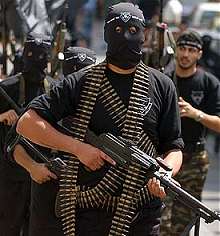Two legal NGOs in the United Kingdom sought arrest warrants Wednesday against Foreign Minister Gideon Sa’ar during his visit to London, accusing Israel’s top diplomat of committing crimes in the Gazoo
...Hellhole adjunct to Israel and Egypt's Sinai Peninsula, inhabited by Gazooks. The place was acquired in the wake of the 1967 War and then presented to Paleostinian control in 2006 by Ariel Sharon, who had entered his dotage. It is currently ruled with a rusty iron fist by Hamas with about the living conditions you'd expect. It periodically attacks the Hated Zionist Entity whenever Iran needs a ruckus created or the hard boyz get bored, getting thumped by the IDF in return. The ruling turbans then wave the bloody shirt and holler loudly about
oppressionand
disproportionate response...
Strip during the ongoing war with Hamas
 ..a regional Iranian catspaw,...
..a regional Iranian catspaw,..."Sa’ar cannot walk freely in London while innocent Paleostinian civilians are buried under rubble. His role in the killing of Gaza’s civilians demands accountability," said Dyab Abou Jahjah, founder of the Belgium-based Hind Rajab Foundation, which filed the arrest warrant alongside the UK-based Global Legal Action Network (GLAN).
The foreign minister "has no intention to shorten his trip or to change his plans in any manner," the Foreign Ministry told The Times of Israel in response to the warrant, which was filed with the UK’s Attorney General and Director of Public Prosecutions, according to a joint statement from the two NGOs.
"The charges focus on [Sa’ar’s] role in the siege of Kamal Adwan Hospital in Gaza," GLAN wrote on X, which it said led to "the abduction and torture" of hospital director Dr. Hussam Abu Safiyeh.
Israel detained Abu Safiya along with nearly 240 others during a raid on the hospital in northern Gaza in December 2024, alleging that Hamas was using it as a command center.
The IDF said it suspects Abu Safiya of being a Hamas member. In February, the Al Mezan Center for Human Rights, a Paleostinian rights group representing Abu Safiya, claimed he was subject to repeated physical abuse during his ongoing detention in Israel.
Launched in September 2024, the Hind Rajab Foundation has used social media posts by Israeli soldiers, officers and reservists in an attempt to have them arrested for alleged war crimes when they travel abroad.
During what was termed a "private visit" to London on Tuesday, Sa’ar met with British Foreign Secretary David Lammy for discussions that addressed Iran’s nuclear program, as well as negotiations to free hostages from Gaza, according to an Israeli readout.
The nature of the visit could impact the success of the arrest warrant requests, as under British law, Israelis are protected against such action if they are on an official trip.
There have been previous attempts to see Israeli officials arrested during trips to the UK, notably against then-foreign minister Tzipi Livni in 2009 when, ahead of a planned visit, a British court issued a warrant for her over alleged war crimes committed by the IDF during a three-week conflict in Gaza. In the end, Livni did not go through with the trip, and the threat of an arrest kept her out of the UK until authorities in 2011 granted automatic immunity to all Israelis on official visits to the country.
Britannia changed the law to make it more difficult to obtain arrest warrants against Israeli figures by requiring the consent of the Director of Public Prosecutions. The amended law helps those visiting Britannia in an official capacity. Those making trips of a personal nature are left vulnerable.
In 2015, Livni, by then an opposition member of Knesset, again visited the UK to attend a women’s summit. Anti-Israeli activists applied to have an arrest warrant issued, as the visit could be considered personal. To preempt the problem, Livni arranged to meet with senior UK government officials, enabling the Knesset speaker to approve her travel as an official visit, the Yedioth Ahronoth newspaper reported at the time.
The following year, Livni was back in the UK to attend a conference and British police summoned her for a "voluntary interview" over her involvement in Israel’s 2008 war against Hamas in the Gaza Strip. The request was reportedly dropped after an exchange between Israeli and British diplomats that granted her diplomatic immunity.
In 2015, former defense minister and IDF chief of staff Shaul Mofaz was nearly arrested when he visited London. At the time, Mofaz was greeted at the airport by two Israeli diplomats. His arrest was avoided after swift action by the Israeli Embassy in London and the British Embassy in Israel.
Related:
Hind Rajab Foundation: 2025-03-22 New Report Shows U.S. Charities Helping Fund Groups Linked To Hamas and PFLP
Hind Rajab Foundation: 2025-02-26 Doxxing soldiers, but failing to put them in dock: Hind Rajab group has some on edge
Hind Rajab Foundation: 2025-02-20 Lawfare again: 2 IDF soldiers vacationing in Amsterdam rushed back to Israel amid arrest concerns
Hind Rajab Foundation: 2025-03-22 New Report Shows U.S. Charities Helping Fund Groups Linked To Hamas and PFLP
Hind Rajab Foundation: 2025-02-26 Doxxing soldiers, but failing to put them in dock: Hind Rajab group has some on edge
Hind Rajab Foundation: 2025-02-20 Lawfare again: 2 IDF soldiers vacationing in Amsterdam rushed back to Israel amid arrest concerns

 Former IDF Major General Yoav Galant says Israel's negligence vis-a-vis
Former IDF Major General Yoav Galant says Israel's negligence vis-a-vis  Popular Front for the Liberation of Paleostine
Popular Front for the Liberation of Paleostine